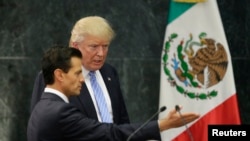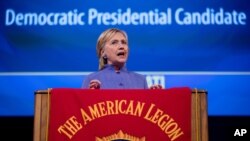If you are waiting for a kinder, gentler Donald Trump on immigration, don’t hold your breath. In what may have been a pivotal day in the 2016 presidential campaign, Trump doubled down on his tough stance on illegal immigration in Phoenix, Arizona late Wednesday, just hours after presenting a more presidential persona in a meeting with Mexican President Enrique Pena Nieto.
Trump outlined an aggressive 10-point plan to stop illegal immigration during his rally, reminding voters of the central issue in his rise to claim the Republican Party’s presidential nomination. Trump’s main focus was on removing criminal elements who had entered the country illegally, and he reiterated his pledge to build a border wall with Mexico and have that country pay for it.
Looking for a softer reboot
Some moderate Republicans have been pushing Trump to soften his tone on immigration, especially his previous vow to deport the estimated 11 million illegal immigrants who have come into the country over the past several years. Illegal immigration has been Trump's signature issue since he launched his presidential campaign in June of last year. His sometimes divisive rhetoric has also alienated large numbers of Hispanic voters, according to numerous public opinion polls. At the moment, Trump is running behind the levels of support from Hispanic voters accorded to the 2012 Republican nominee, Mitt Romney, and the 2008 nominee, John McCain.
Trump seemed to take a firm line in his speech on Wednesday, harkening back to his tough rhetoric during the primary season. “For those here illegally today who are seeking legal status, they will have one route and one route only - to return home and apply for re-entry like everybody else. We will break the cycle of amnesty and illegal immigration. We will break the cycle.”
Abrupt about-face
Trump’s aggressive stance was a swift change from hours earlier when he met with President Pena Nieto in Mexico City. Trump said they discussed the border wall but not who would pay for it. Pena Nieto did not challenge Trump’s account during their joint press appearance but later said on Twitter he told Trump at the outset of their meeting that Mexico would not pay for the wall.
The Hillary Clinton campaign blasted Trump’s Arizona speech in a written statement and accused Trump of “doubling down on his anti-immigrant rhetoric” and attempt at “demonizing immigrants.”
Candidate Clinton has also been warning voters of late to beware of any Trump efforts to moderate his rhetoric or policy positions.
“And now Trump is trying to rebrand himself as well. But don’t be fooled. There is an old Mexican proverb that says, tell me with whom you walk and I will tell you who you are. Well, we know who Trump is,” Clinton told supporters at a recent rally in Reno, Nevada.
Clinton continues to lead Trump in national and key state polls, although some recent national polls have grown tighter. Trump, however, appears to be struggling to broaden his base of support beyond the groups he appealed to in the Republican primaries, according to Georgetown University analyst Stephen Wayne.
“Because he appealed to an angry segment of the Republican Party, which is not necessarily the country as a whole. This general election seems to be a referendum for or against Trump. And he won it in the primaries and he’s losing it in the general election because of the very appeals he made in the primaries.”
Clinton's high negatives
Clinton has some problems of her own. The Trump campaign hammers her on a daily basis for refusing to hold a news conference. And recent polls show an increase in voters who don’t consider her trustworthy, another factor that may explain why Clinton’s lead may be slipping.
“Hillary Clinton has massive flaws,” said Jeremy Mayer, an assistant professor of government at George Mason University in Virginia. “And had the Republicans nominated a typical Republican, not a former President Ronald Reagan but just your average politician, the race would probably be neck-and-neck right now, given her vulnerabilities.”
Trump’s latest affirmation of his strong stand against illegal immigration may buttress his support among his political base; but, Georgetown’s Stephen Wayne argued that Trump has yet to unify the Republican Party behind his candidacy. “So he has to solidify the Republican base, and he has not done that as yet, and two, he has to reach beyond that base because Republicans have not won a majority in a presidential election since 2004.”
Clinton has built a lead since the party conventions in July; but, with the race tightening once again, Gallup pollster Frank Newport cautions there could be more surprises to come in the final two months of the campaign. “If you look at history, things do change between now and election day, so you can’t say everything is frozen at this point.”
Both candidates increasingly are likely to focus on the coming presidential debates with the first one scheduled for September 26.








